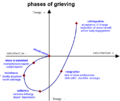Kübler-Ross model facts for kids
The Kübler-Ross model, also known as the five stages of grief, is a well-known idea about how people might feel when they are dying or when they experience a big loss. It describes five common steps: denial, anger, bargaining, depression, and acceptance.
This idea came from Elisabeth Kübler-Ross, a Swiss-American psychiatrist. She wrote about it in her 1969 book called On Death and Dying. Her work helped many people understand the difficult feelings that come with loss and sadness.
Contents
Who Was Elisabeth Kübler-Ross?
Elisabeth Kübler-Ross was a doctor who spent a lot of time working with people who were very sick or dying. She listened carefully to their stories and feelings. She noticed that many people seemed to go through similar emotional journeys. Her goal was to help people understand and talk about death more openly.
Understanding Grief
Grief is a natural and strong feeling of sadness. It happens when someone loses something important to them. This could be the death of a loved one, but it could also be losing a pet, moving away from friends, or even a big change in life like a serious illness. The Kübler-Ross model helps explain some of the feelings people might have during these tough times.
The Five Stages of Grief Explained
It's important to remember that these stages are not a strict set of rules. People don't always go through them in order, and some people might not experience all of them. These stages are more like common reactions that many people have.
Denial: "This Can't Be Happening"
When something very sad or shocking happens, the first reaction might be denial. This is like a shield that protects you from the full shock of the news. You might feel numb or find it hard to believe what has happened. It's a way for your mind to cope with something too big to handle all at once.
Anger: "Why Me? It's Not Fair!"
After the shock wears off a bit, feelings of anger might appear. You might feel angry at the situation, at others, or even at yourself. This anger can be aimed at doctors, family, friends, or even the person who died. It's a powerful emotion that comes from feeling helpless and frustrated.
Bargaining: "What If I Could Change It?"
In this stage, you might try to make deals or promises. You might think, "If only I had done this differently," or "I promise to do something good if things could go back to how they were." This is a way of trying to get back control or find a way to avoid the pain. It's often filled with "what if" thoughts.
Depression: "I Feel So Sad and Hopeless"
As the reality of the loss sinks in, deep sadness can set in. This is the stage of depression. You might feel very tired, lose interest in things you used to enjoy, or want to be alone. It's a time when you truly feel the weight of the loss. This sadness is a natural part of healing.
Acceptance: "I Can Live With This"
Acceptance doesn't mean you are happy about the loss. Instead, it means you have come to terms with the new reality. You start to find ways to live with the change. The intense pain might lessen, and you begin to look towards the future, even if it's different from what you expected. It's about finding a way to move forward.
Important Things to Remember
- Not a Straight Line: People don't go through these stages in a neat order. You might jump between stages, go back to an earlier one, or skip some entirely.
- Everyone is Different: How someone grieves is very personal. There's no right or wrong way to feel.
- Healing Takes Time: Grief is a process, and it takes time to heal. It's okay to feel sad, angry, or confused.
- Support is Key: Talking to trusted adults, friends, or a counselor can be very helpful when you are grieving.
The Kübler-Ross model helps us understand that difficult feelings are a normal part of dealing with loss and change. It reminds us to be patient and kind to ourselves and others during these times.
Images for kids
See also
 In Spanish: Modelo de Kübler-Ross para niños
In Spanish: Modelo de Kübler-Ross para niños



